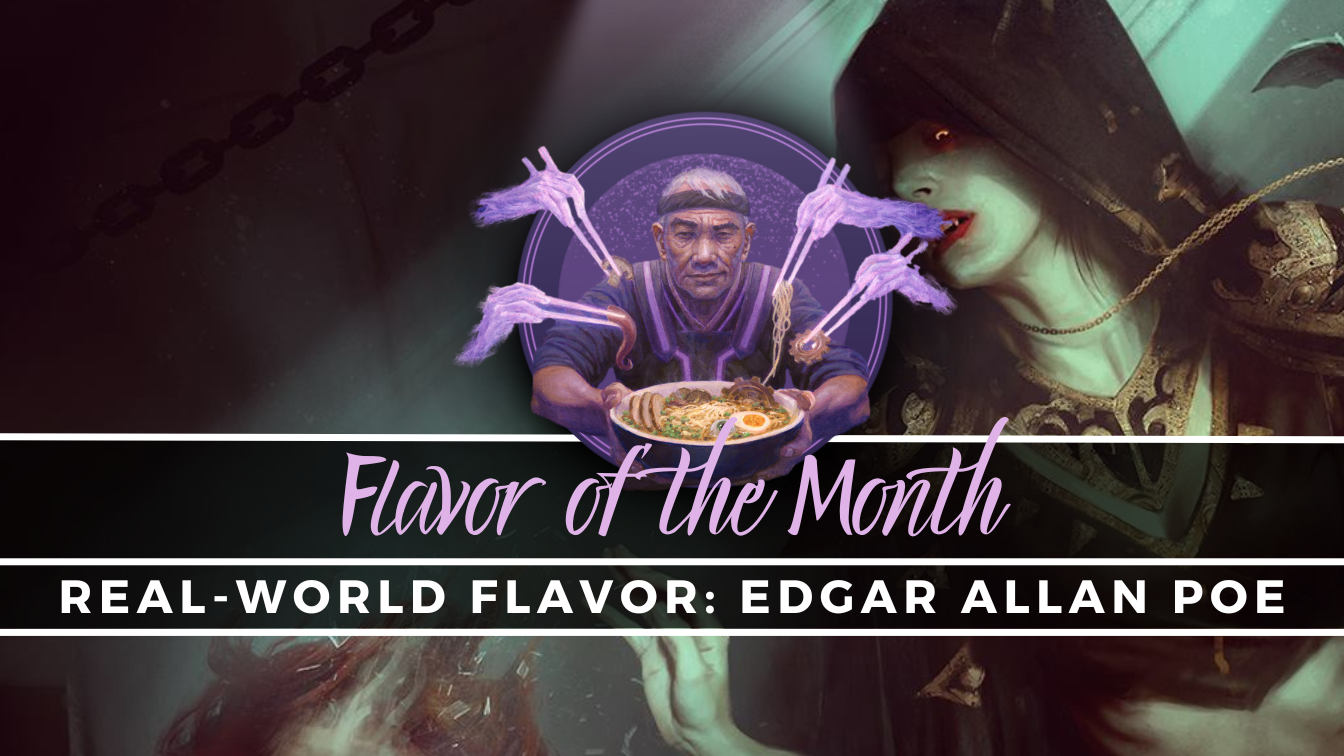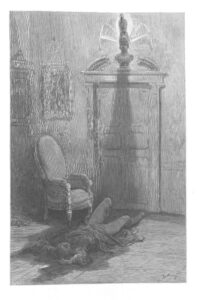Flavor of the Month: Edgar Allan Poe (Real-World Flavor Text)

Quoth the Raven, "Do you pay the one?"
Welcome to Flavor of the Month, where we use cards' flavor as a recipe for building decks! In this installment, we're going to go back to the literary well--or should I say pit--in another Real-World Flavor Text. Just in time for Halloween, we're diving into every angsty middle school child's favorite writer: Edgar Allan Poe!

Last time around, we looked at the bevy of old Magic cards that had flavor text by William Shakespeare, but for most individual real-world sources featured on cards, there aren't quite as many. Poe has a grand total of six cards, so while we'll use the ones we can, the deck build will be more focused on some overriding themes in his work and how we can represent them best in Magic form.
Naturally, we're going to be in mono-black for this deck, which rules out two of those six cards of his:
Eh. No huge loss. The Phantom Monster
For the other cards we can use, we have some... well, these first two are sure Magic cards:
Okay, I actually rather like Urborg
Here we have two cards that are at least powerful in the right circumstances: Contagion Engine
More interesting here is the choice of flavor text on these cards: quotes from The Raven, undoubtedly his best-known work (how did they not use The Raven until 2022?!), and his short story The Pit and the Pendulum. These are the two works we're going to focus on most as we build.
Ingredients
I'll admit I'm not as well-versed in Poe's work as I am in other writers', despite his stature in the literary world. Any time people who aren't the bookish type know who a writer is, it's fair to assume they left a mark. Almost everyone growing up in the U.S. knows who Edgar Allan Poe is. There's even a dang football team named after his most famous poem, a sentence that brings my jaded poet heart no small amount of joy.
All of this is to say, there won't be a whole ton of deep cuts snuck into this deck; sure, there'll be some moaning and groaning of the bells
In The Pit and the Pendulum, the narrator is a prisoner of the Spanish Inquisition, sentenced to death, but the means of that execution are not known to him. He awakens in a pitch-black space, at first thinking he was buried alive. He was not buried alive; rather, his torturers expect him to fall into a deep pit in the darkness and perish that way. When he lucks into discovering the pit without falling in, they drug him, then tie his body down while a razor-edged pendulum slowly, almost imperceptibly, drops from the ceiling, threatening to end his life if it makes it down to him and cleaves into his chest. (Sure, this is a dark story; just be glad I'm not doing a deck based on Kafka's In the Penal Colony!)
In this short story, the horror comes from two distinct and opposed angles in its different scenes. The first, in the dark room, showcases the fear of unknowing: he knows he's condemned to death, but is unaware of the means, and thus every action he takes could cause his untimely demise. Action, then, is danger, is death. In the next scene, with the cell no longer in total darkness, he's restrained and made to watch his death slowly make its way to him. The pendulum descends at a maddeningly slow rate; the narrator describes a range of emotions from despair to elation to acceptance to panic as the blade nears him. Here, danger takes the form of inaction.
Meanwhile, The Raven depicts a far more quotidian situation: here our narrator isn't sentenced to death but is simply a widower on a cold night missing his departed Lenore. A large bird, the titular raven, taps on the outside of his abode; when the speaker goes to investigate (strangely, he makes no Clue token), the bird hops inside and perches on a stone bust of Athena above the main doorway. At first, the speaker is perturbed and paranoid about the sound outside, but discovering it was the raven, that stress turns to amusement. Asking the bird its name--kind of like how we talk to our animals, not expecting them to respond to us--the speaker is shocked to hear the raven croak out the word "Nevermore" in reply.
From there, the speaker's mental faculties quickly deteriorate; in his madness and grief at the loss of his Lenore, he attributes all sorts of things to the raven--that it's an omen, or a devil, or perhaps that it can tell him if his Lenore is in Heaven--and is unwound by this bird, who sits there stoically intoning the same word.
The Raven's unspooling rhyming and quick, heart-racing meter make it an exhilarating and enjoyable read, even now, over 170 years since it was first published:
Ah, distinctly I remember it was in the bleak December;
And each separate dying ember wrought its ghost upon the floor.
...
Deep into that darkness peering, long I stood there wondering, fearing,
Doubting, dreaming dreams no mortal ever dared to dream before;
But the silence was unbroken, and the stillness gave no token,
And the only word there spoken was the whispered word, "Lenore?"
This I whispered, and an echo murmured back the word, "Lenore!"--
Merely this and nothing more.
...
And the Raven, never flitting, still is sitting, still is sitting
On the pallid bust of Pallas just above my chamber door;
And his eyes have all the seeming of a demon's that is dreaming,
And the lamp-light o'er him streaming throws his shadow on the floor;
And my soul from out that shadow that lies floating on the floor
Shall be lifted--nevermore!
...and the image of the speaker collapsing into his own grief under the stern, downturned gaze of the raven perched above his door is an all-timer:

The Raven is one of the most enduring works of art in American letters; this is due, in my estimation, to the fact that the story is so simple and yet so profoundly realized (and it's intricately crafted, musical, unique, interesting, catchy in its refrain, sure sure all of those things). A man who is so wracked by grief that this raven's mere presence uncorks the pain, frustration, and fear bubbling up inside him; whether or not the bird actually speaks or is a figment of the speaker's imagination is not even close to the point.
We're already getting a little long in the tooth here, so let's get to the cards. It might seem like a cop-out, but I chose The Raven Man
Preparation
As one of the original horror masters, Poe didn't lean on scary monsters or the literary equivalent of jump-scares: in his works, the most impactful horrors were moments when our psychological stability is threatened, when our control and emotions get away from us. As such, we have a deck here that plays with the madness mechanic, a great fit for The Raven Man
It won't be just us discarding cards, though: that's for the whole table, we're just the ones who will benefit most from it. Hearkening back to the Pit, discarding reflects the frustrating lack of options the narrator had. The closest thing to confinement we can get in a game of Magic: having your hand and resources stripped away.
The wide range of powerful emotions on display in Poe's work find a home in this deck; there's no lack of dramatic, upsetting and/or macabre spells and arts. Hence Guiltfeeder
Speaking of the Abyss: yes, we have The Abyss
Since The Raven Man
And finally, what are we going to do with all these dang birds we've amassed over the turns? Well, we could smack our opponents with them...or we could turn them into more cards to torment our enemies--I mean, our friends. Our friends, playing this nice, fun game at the LGS with us.
Yield
What hath our madness (literally) wrought? Steel your nerves and check out the full decklist!
Real-World Flavor Text: Edgar Allan Poe
View on ArchidektCommander (1)
Enchantments (12)
Artifacts (10)
Creatures (29)
- 1 Abyssal Nocturnus
- 1 Abyssal Persecutor
- 1 Archfiend of Ifnir
- 1 Asylum Visitor
- 1 Big Game Hunter
- 1 Bone Miser
- 1 Bone Picker
- 1 Braids, Arisen Nightmare
- 1 Carrion Crow
- 1 Containment Construct
- 1 Crow of Dark Tidings
- 1 Fell Specter
- 1 Frozen Shade
- 1 Gix, Yawgmoth Praetor
- 1 Grave Scrabbler
- 1 Guiltfeeder
- 1 Hell Mongrel
- 1 Magus of the Abyss
- 1 Mirkwood Bats
- 1 Necrogoyf
- 1 Necromancer's Familiar
- 1 Phantasmagorian
- 1 Psychosis Crawler
- 1 Rankle, Master of Pranks
- 1 Skirge Familiar
- 1 Sootfeather Flock
- 1 Tergrid, God of Fright // Tergrid's Lantern
- 1 Tinybones, Trinket Thief
- 1 Zulaport Cutthroat
Sorceries (10)
Instants (4)
That's it for this installment of Flavor of the Month's Real-World Flavor Text! I hope you had fun looking closely at a couple of Edgar Allan Poe's classic works and joining me on this experiment translating them into a playable creation. I very much enjoy using Magic as a medium for expression; in this case, showing appreciation for an author and his literature. I'm excited to see what else we can do with this form in future articles, and I'd love it if you joined me for the ride.
Until next time--
here I opened wide the door;--
Darkness there and nothing more.